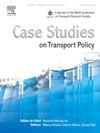Identification of antecedents of risky driving behavior of food delivery riders: An analysis during the COVID −19 pandemic in Brazil
IF 2.4
Q3 TRANSPORTATION
引用次数: 0
Abstract
An increased demand for online food delivery services has been observed due to restrictions imposed by the Covid-19 pandemic. These services are provided by motorcycled food delivery riders (FDRs), who are often informally employed, poorly paid, and work under time pressure, which might increase the risk of traffic crashes. Until now, few studies have been concerned with the effects the Covid-19 pandemic has had on driving behavior, especially for FDRs. Furthermore, it remains unclear whether work conditions and financial vulnerability could influence driving behavior. In addition, related studies have been conducted in Europe, but research in this field in South America seems to be lacking. Therefore, this paper aims to identify the antecedents of risky driving behavior for FDRs in Brazil during the Covid-19 pandemic. Therefore, an extended framework based on the protection motivation theory was proposed. Data were obtained from 295 FDRs and were analyzed using Partial Least Squares Structural Equation Modeling. The results showed that working conditions and financial vulnerability positively affect their driving behavior. Additionally, coping appraisal has a negative and significant effect on risky driving behavior. The effect of threat appraisal on risky driving behavior was found to be positive, which could be indicative of a typical behavior of young drivers. Therefore, FDRs perform a risky activity due to long working hours and the pressure for fast deliveries. Also, to meet short delivery time, FDRs adopt a risky behavior (red-light running, driving while checking cell phones and not using safety equipment).
外卖司机危险驾驶行为的前因识别:巴西COVID - 19大流行期间的分析
由于Covid-19大流行实施的限制,对在线食品配送服务的需求有所增加。这些服务是由骑摩托车的送餐骑手提供的,他们通常是非正式就业,工资低,工作时间紧迫,这可能会增加交通事故的风险。到目前为止,很少有研究关注Covid-19大流行对驾驶行为的影响,尤其是对fdr的影响。此外,尚不清楚工作条件和经济脆弱性是否会影响驾驶行为。此外,欧洲也进行了相关研究,但在南美似乎缺乏这方面的研究。因此,本文旨在确定新冠肺炎大流行期间巴西fdr危险驾驶行为的前因。因此,本文提出了一个基于保护动机理论的扩展框架。数据来源于295个fdr,采用偏最小二乘结构方程模型进行分析。结果表明,工作条件和经济脆弱性对其驾驶行为有正向影响。此外,应对评价对危险驾驶行为有显著负向影响。威胁评估对危险驾驶行为的影响是正向的,这可能是年轻司机的典型行为。因此,由于长时间的工作和快速交货的压力,fdr从事的是一项危险的活动。此外,为了满足短时间交货,fdr采取了危险的行为(闯红灯,开车时看手机,不使用安全设备)。
本文章由计算机程序翻译,如有差异,请以英文原文为准。
求助全文
约1分钟内获得全文
求助全文

 求助内容:
求助内容: 应助结果提醒方式:
应助结果提醒方式:


